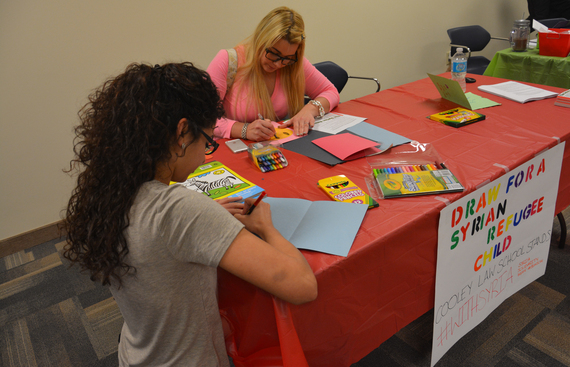In recent weeks, a number of efforts bringing attention to Syria's humanitarian catastrophe have emerged. Perhaps most notable is the #NoLostGeneration campaign, inspired by a UNICEF report on the grave impact the three-year conflict has had on Syria's children. The report and the infographic, images and social media campaign that followed it are part of an international attempt to shine the spotlight on more than 5 million kids who have been negatively impacted by Syria's popular revolution-turned-civil war.
For three years, Syrians have felt largely abandoned by the international community that watched idly as Bashar al-Assad's forces met unarmed protesters with gunfire, and that continued to observe as the regime committed war crimes against humanity, implemented a scorched earth policy, and employed "starve into submission" tactics in besieged areas. It is perhaps Syrians' feelings of being deserted that inspired the name of the #WithSyria campaign, "a global call to make the 3rd anniversary of Syria crisis the last marked by bloodshed," and a reminder to the world that Syria is enduring the worst humanitarian crisis of the 21st century.
On a national level, Syrian-American youth decided to raise awareness through Syria Solidarity Week activities during the month of March. When considering what to do at our school -- the Thomas M. Cooley Law School in Tampa -- my sister and I decided that drawings cards for Syrian refugee children would be a simple yet effective means of showing support while informing people about the trauma Syria's children face. As my constitutional law professor loves to remind us, "save the children" is a universal slogan that anyone can stand behind.
As a part of the activity, I prepared a fact sheet with some statistics included in the UNICEF report: Up to 1 million Syrian children live under siege or in hard-to-reach areas, 3 million Syrian children have been forced out of school, more than 40 thousand schools have been destroyed or are being used as shelters, and 1 in 10 Syrian refugee children is working to support his or her family.
When you throw these facts at people -- Did you know that 1.2 million Syrian children are registered as refugees with the United Nations and 10 thousand Syrian kids have been killed over the last three years? -- the numbers don't necessarily register. But when you combine the facts with an opportunity to make a minor difference in the life of a Syrian child, even through a simple gesture like drawing a card and writing a message of support, people begin to appreciate and better understand the message you are trying to send.
Students at Cooley Law School participate in Syria Solidarity Week by making cards to be delivered to Syrian refugee children. March 19, 2014. Source: Maryam Saleh
After one of my classmates finished making her card, she skimmed the fact sheet I had given her. "This one disturbs me the most," she said, pointing to the paper. "Which one?" I asked, as I glanced at the paper.
"Syrian children have been arrested, detained and tortured in detention facilities by government forces. The UN has documented cases of sexual violence against children while detained by government forces in formal and informal detention centers."
And who wouldn't be disturbed by such a statement? The American public might be, to a certain degree, oblivious to the situation on the ground in Syria, their limited knowledge skewed by what mainstream media thinks is worthy of reporting. But today, I realized something that has been easy to forget: It's not that people don't care, it's that they don't know, which is what makes my job as a Syrian-American and as a citizen of this earth in informing them so much more important.
I cannot reiterate this enough, but I was truly overwhelmed by the amount of love and support my peers showed when drawing their cards. They competed to see who could be the most creative artistic, they tried to write in Arabic (though they don't speak a word of it) so they could make a personal connection to the kids, and they did everything they could to ensure their messages put a smile on the face of children who have seen so much misery.
During the four hours we spent drawing, I learned an invaluable lesson: Give people a reason to care, and they will leave you speechless with the amount of love and compassion in their hearts.
Today, tomorrow, and every day after, we are all Syria's children.
